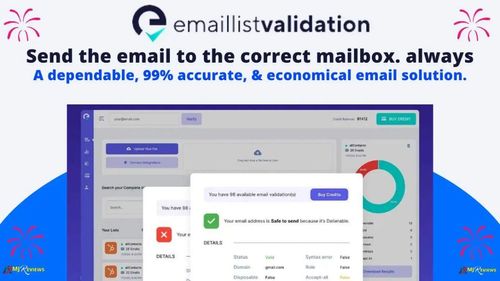In the realm of email marketing, maintaining a clean and accurate email list is paramount to success. One of the most effective ways to ensure data accuracy and deliverability is through email validation. While there are various email validation services available, creating your own custom email validation tool can be a game-changer. In this comprehensive guide, we'll delve into the world of free email validation software templates, enabling you to build your own tools, boost data accuracy, and supercharge your email marketing campaigns.
Why Email Validation Matters
Before we dive into the creation of custom email validation software, let's understand why it's crucial for your email marketing success:
Enhanced Deliverability: Validating email addresses ensures that your messages reach recipients' inboxes, reducing bounce rates and boosting deliverability.
Improved Data Quality: A clean email list means accurate data, enabling you to engage effectively with your audience and make data-driven decisions.
Cost Savings: By eliminating invalid or non-existent email addresses, you save money on email marketing campaigns, as you're targeting real and engaged users.
Compliance: In many regions, email marketing regulations, such as GDPR, require explicit consent from users and accurate data management, which email validation supports.
Creating Custom Email Validation Software
Now, let's explore the steps to create your own custom email validation software using templates:
Define Your Requirements: Begin by outlining your specific requirements and objectives for the email validation tool. Consider factors such as the volume of emails you need to validate and the integration with your existing systems.
Select a Template: Several free email validation software templates are available online. Choose a template that aligns with your goals and technical expertise. You can find templates in various programming languages, including Python, JavaScript, and Ruby.
Customize the Template: Once you've selected a template, customize it to meet your requirements. You may need to specify the validation rules, such as email format, domain verification, and more.
Integrate with APIs: To enhance accuracy, consider integrating your tool with email verification APIs, such as those offered by Clearout or ZeroBounce. These APIs provide real-time validation and additional features.
Test Thoroughly: Before deploying your custom email validation tool, thoroughly test it with a diverse set of email addresses. Ensure that it accurately identifies valid and invalid emails and handles errors gracefully.
Implement Automation: To streamline your email validation process, automate the tool's execution. You can schedule regular validations or integrate it into your email marketing platform.
Benefits of Custom Email Validation Software
Creating custom email validation software offers several advantages:
Tailored to Your Needs: Custom tools can be tailored to your specific requirements, ensuring they address your unique challenges.
Cost-Efficient: While there may be initial development costs, custom tools can be cost-efficient in the long run compared to subscription-based services.
Data Privacy: You have full control over data privacy and security, ensuring compliance with regulations like GDPR.
Integration: Custom tools can be seamlessly integrated with your existing systems and workflows, streamlining the validation process.
Scalability: As your email list grows, you can scale your custom tool to accommodate the increased volume.
Commonly Asked Questions About Free Email Validation Software Templates
1. Do I need coding skills to create a custom email validation tool?
- While coding skills are beneficial, you can work with developers or use templates to create custom tools without extensive coding knowledge.
2. Are custom tools as accurate as subscription-based email validation services?
- The accuracy of custom tools depends on the quality of your implementation and integration with validation APIs. Subscription-based services may offer higher accuracy out of the box.
3. Can I create custom tools for bulk email validation?
- Yes, you can create custom tools for bulk email validation by customizing templates and implementing batch processing.
4. How often should I validate my email list using custom tools?
- The frequency of validation depends on your email list's size and activity. Regular validation, such as before each campaign, is advisable.
5. Are there templates available for different programming languages?
- Yes, you can find email validation templates for various programming languages, making it accessible to a wide range of users.
In conclusion, free email validation software templates empower you to create custom tools that enhance data accuracy and deliverability in your email marketing campaigns. By following the steps outlined in this guide and considering your specific requirements, you can build a tailored email validation solution that aligns with your business goals, saves costs, and ensures compliance with data privacy regulations. Elevate your email marketing game by harnessing the precision of custom email validation tools.



